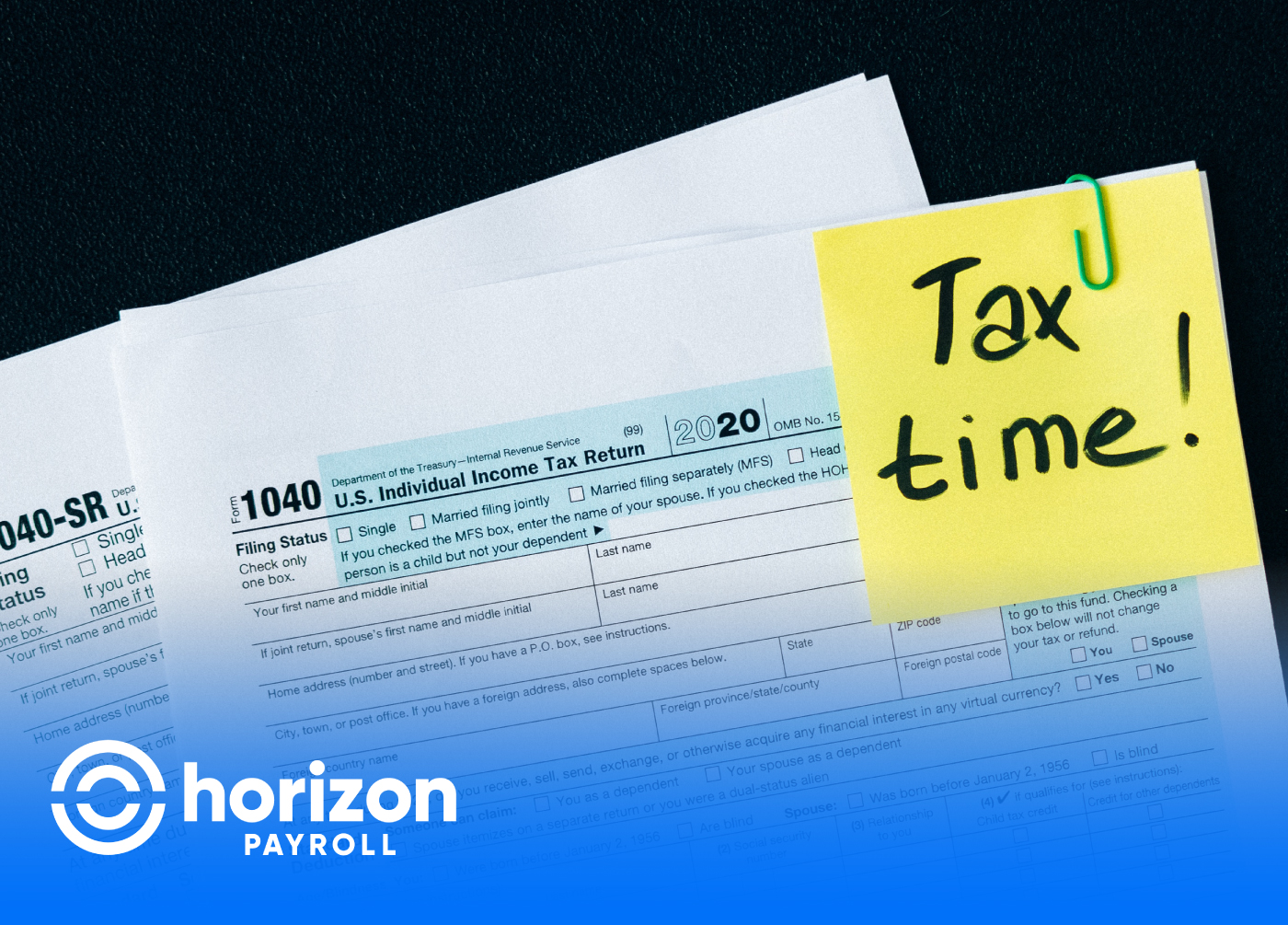6 min read
Breaking Down Payroll for Employers
Managing payroll can be a complex task for any employer. From calculating employee wages to understanding and complying with various tax regulations,...
Expert payroll management services with a personal touch.
View Solution Read Guide HR Support
HR SupportSimplify and personalize HR with a team of HR experts on-demand.
View Solution Read Guide Time & Attendance
Time & AttendanceWhy spend more unnecessary time and money managing your workforce?
View Solution Read Guide Hiring & Onboarding
Hiring & OnboardingTurn your candidates into employees with hiring & onboarding solutions.
View Solution Read GuideAdd On Solutions automate everyday tasks, prevent mistakes, and simplify business compliance.
View SolutionHelpful downloads and eBooks to empower your business.
Helpful tax and HR alerts to help keep your business compliant.
Payroll and tax-related forms and documents.
Log in to your employer (admin) and employee portals.
Horizon's blog provides valuable insight into payroll, compliance, human resources, and more.
See our client success stories for a case study on how we can help your business.
Payroll and HR strategy requires intelligent technology, personal attention and specialized expertise in the needs and nuances of your business.
We provide payroll and tax processing services for businesses from 1 to 1,000 employees or more. Today, we have nearly 1,000 customers in 40 states.
6 min read
![]() Horizon Payroll Solutions
:
February 5, 2024 at 2:15 PM
Horizon Payroll Solutions
:
February 5, 2024 at 2:15 PM
With the passing of Tax Day on April 18th, 2023, the most hectic period of tax season may be behind us; however, the day most of our income tax filings are due is only one of a long list of important dates that businesses have to keep in mind as we make our way through the year. Depending on the type of business you own, how many employees you retain, and how your organization is structured, there are several additional dates that you’ll want to be aware of as we transition from the 2022 tax year into 2023 and beyond. Read on to learn more!
The IRS has a wide range of regulations that apply to businesses of every shape and size, and they will not hesitate to enforce them to ensure that taxes owed become taxes paid.
In order to avoid substantial fines, legal issues, and other tax-related trouble, business owners should be hyper-aware of their organizations’ tax compliance. This includes both the usual day-to-day tracking of payroll taxes, expenses, and income, as well as the filing deadlines for the different types of business taxes that apply. Every business owner should know and understand their tax obligations and ensure they’re prepared to file according to specific deadlines throughout the year.
A key point for many business owners to keep in mind is the difference between filing a tax return and making a tax payment. Simply filing tax documentation or an information return does not mean that you’ve satisfied your obligation; if additional fees or underpaid taxes are due, such as those that may have been undershot when filing estimated taxes, those payments must be made before the appropriate deadline. As you prepare to file your business taxes, don’t neglect to take the additional step of making any necessary payments.

With the variety of tax filing deadlines spread throughout the year, it’s possible – though hopefully not likely – that your business may have missed an important due date. The consequences of missing a tax deadline heavily depend on the kind of deadline that was missed and whether your business owed additional taxes to the IRS or earned a refund by overpaying. If your business is owed a refund, there are usually no penalties for missing a tax deadline. In fact, you generally have up to three years to claim a tax refund from a return, though it’s always best to complete your filings as soon as possible. On the other hand, if you owe additional taxes to the IRS due to underpayment, the penalties can be severe. For every business day past the deadline, interest, fines, and fees begin accruing, and if payment is not arranged, additional legal consequences can arise.
If you’re running up close to the deadline and need extra time, it’s always a good idea to file for a tax extension rather than rush through the process and potentially make mistakes. The IRS almost always grants an extension to those who request one, with one critical note: a tax extension only applies to filing documents like tax returns and does not grant additional time to pay any tax you may owe. For that reason, if you’re planning to file an extension but believe you will end up owing instead of getting a refund, you’ll need to estimate the amount you believe you’ll owe and make a payment by the filing deadline. Failure to do so may result in your business being considered delinquent.
S-Corporations and partnerships like multimember LLCs typically have a filing deadline of March 15th; however, a six-month automatic extension can be granted if they file Form 7004. This will extend the deadline to September 15th, provided they (like most) are filing according to the calendar year and not the fiscal year.
C-Corporations, sole proprietors, and individual LLCs, unlike S-Corps and multimember LLCs, have a filing deadline that falls in with the majority of individuals: Tax Day (April 18th in 2023, otherwise typically April 15th unless the date falls on a weekend or a holiday). Just like individuals filing their taxes, C-Corps, sole proprietors, and individual LLCs can file Form 4868 to extend their tax deadline; however, keep in mind that if any tax is owed, estimated payments will need to be made by the Tax Day deadline to avoid becoming delinquent.

Important dates for your business taxes aren’t just confined to tax season; depending on your circumstances, they’re spread throughout the year from January to December. Whether you’re an individual LLC or an S-Corp, though, you’ve got a business tax deadline sooner or later, and it is in your best interest to ensure your documents are filed on time. Stay on top of the key dates you’ll want to look out for with our quick refresher below!
For most businesses that work in a calendar year rather than a fiscal one, the deadline to file income taxes is the same as for individuals: April 15th. In 2023, this date got pushed to April 18th because the 15th fell on a Saturday, but unless the 15th falls on a weekend or a holiday, it serves as the deadline for both business income tax filings and individual tax returns. Schedule C, sole proprietors, and C-Corps must also file their income tax returns by this date. Partnerships, multimember LLCs, and S-Corps need to file earlier: returns for these kinds of businesses are due by March 15th, one month before Tax Day.
Due to the IRS’s “pay-as-you-go” system for collecting tax payments, some businesses and individuals may be required to make quarterly estimated tax payments throughout the tax year if they meet certain conditions. Typically, S-Corps or C-Corps that expect to owe more than $500 in tax payments or individuals that estimate they’ll owe more than $1,000 are required to make an estimated tax payment at the end of every quarter throughout the year.
For S-Corps, C-Corps, sole proprietorships, and individuals, the deadline to make these estimated payments is the same: in 2023, quarterly taxes are due on April 18th, June 15th, September 15th, and, in 2024, January 16th. These due dates are for taxes owed in the preceding quarter; for example, the September 15th deadline will be a payment towards taxes owed on income generated from June 1st to August 31st.
Employment tax is another essential tax liability that small business owners need to ensure is covered and filed on time. Employment taxes cover items like social security, Medicare taxes, wages, and federal income taxes that were withheld from an employee’s pay. The tax deadlines for reporting and paying employment tax depend on a business’s overall tax liability. Form 941, which is a report of the wages your business paid, any tips that were reported, and other employment taxes, are filed quarterly and due by the last day of the month after the end of the quarter. This means that May 1st, July 31st, October 31st, and January 31st are the 2023 deadlines for employment tax. However, if your tax liability is less than $1,000, you can file Form 944 once annually instead of Form 941. Form 944 is due on January 31st of the following year.
A less commonly found kind of tax, excise taxes are imposed on particular goods, services, and activities and can be imposed at any point from the above’s entry into the United States up to its use by the consumer. Goods like coal, alcohol, certain chemicals, petroleum, and the like are commonly subjected to excise tax. The deadlines for excise tax reporting and payment vary depending on which IRS form a business is required to file and why; check the IRS’s website for additional information.
Payroll withholding, like other forms of employment tax, is due to be filed quarterly, with the exception of small businesses with an annual tax liability of $1,000 or less. These entities can file annually, with a due date of January 31st. If your business is filing quarterly, the due dates for these filings are April 30th, July 31st, October 31st, and January 31st, 2024.
Both W-2 forms for regular employees and 1099s are due on the same date. If you worked with and paid any non-employees or independent contractors more than $600, 1099 forms are due by January 31st, and the same penalties that apply to late or missing W-2s can apply if you neglect to file on time. These penalties can include fines between $50 to $580 per employee, depending on the delay, and additional legal consequences can occur if the delay persists.

The world of business payroll and tax compliance can be daunting. When you’re focused on building and maintaining a successful business, the last thing you should be worried about is missing a critical tax deadline that can have hefty consequences.
As a top-rated and trusted partner, Horizon Payroll has been helping businesses of every shape and size navigate the intricate systems of tax compliance, payroll, and human resources management for more than 20 years. Our goal is to sweat the small stuff so you and your team can get back to doing what you do best! Contact us today to schedule a consultation.
Whether you’re looking for an extra set of professional eyes, need better solutions for your payroll management system, or want to invest in your employees through a comprehensive human resources strategy, Horizon has a proven and reliable solution!
To learn more about our industry-leading services and payroll solutions, contact us today!

6 min read
Managing payroll can be a complex task for any employer. From calculating employee wages to understanding and complying with various tax regulations,...

6 min read
Do you rely on a tax refund to pay for a big, recurring expense like a vacation? Are you counting on a refund for a home improvement project? Do...

5 min read
2018 is coming fast! Are you paying attention to the changes and deadlines that are right around the corner? Our tips will help you navigate...